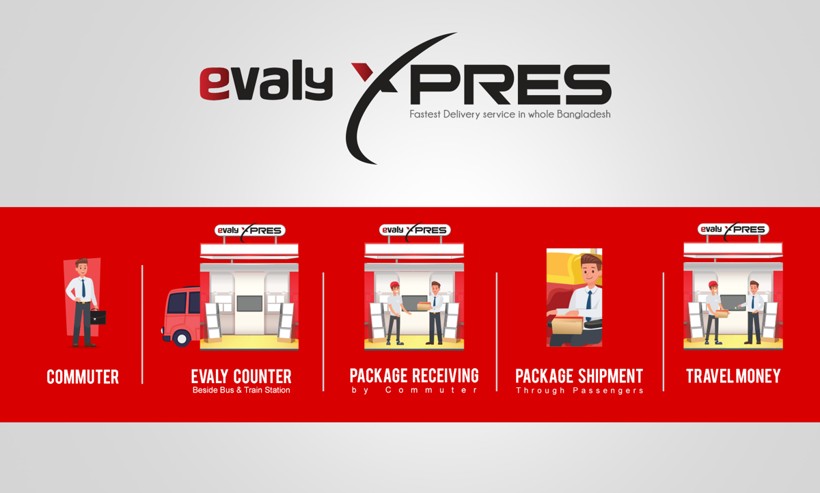
Accordingly UNCTAD, logistics is one of the major setbacks behind sluggish growth of the ecommerce industry in many developing markets. Bangladesh is one those markets. The relatively weak postal service, lack of infrastructure, poor service and limited coverage of traditional and new generation logistics companies have made logistics as one of the more pressing issues for the ecommerce companies in Bangladesh.
In many ways, ecommerce is a distribution business. Ecommerce marketplaces own the customer interaction, which gives them an upper hand in their relationship with the merchants and retailers who in turn agree to give a commission to these marketplaces on the sales. Hence, logistics, delivering the goods directly to the doorsteps of the customers, is a big part of what ecommerce exists for.
People order online for various reasons. One strong reason is, of course, they are either unwilling to go to the market or don’t have access to the product source. Ecommerce bridges this gap. It delivers the product to the customer. This is imperative for the success of any ecommerce player. Timely delivery is among the highest priorities for most ecommerce customers. Unfortunately, this has been a challenge for ecommerce players in Bangladesh since the beginning.
The poor delivery time and delivery management have caused much of the woes in the ecommerce space. The lack of coverage remains a challenge as well which has made expansion outside Dhaka complex and expensive for many ecommerce players.
Broadly, there are a few articles that we notice when it comes logistics concerning ecommerce. There are some traditional and legacy courier services such as Sundarban, Continental and a few others that have coverage across the country but have significant service and customer experience limitations. Most of these services have limited digital integration. The customer experience is subpar.
The advantage these operators has, though, is nationwide coverage with certain service security. They can deliver your product anywhere in Bangladesh. They often make sure that your product reaches the destination, service quality aside. A significant percentage of ecommerce and f-commerce players depend on these players for outside Dhaka delivery. They have robust operations and time-tested systems built over the years. The major challenge of working with these players is that they are not digitally savvy and they seem reluctant to do so. Since their existing operation is doing well due to a growing demand in the market, the motivation for these players to upgrade them is limited.
Then we have a handful of logistics startups that have built their operation and business on the back of the eCommerce industry in the country. These are mostly new generation companies founded by young entrepreneurs trying to take advantage of a fast-growing industry. They offer tailored services to eCommerce companies. However, these companies have their own limitations. Limited coverage is a challenge. Most of these companies cover only Dhaka and a few major metropolitan cities. They are yet to develop time-tested systems and process and necessary infrastructure that can ensure promised service quality.
A small percentage of eCommerce companies also maintain their own logistics operation instead of relying on third-party logistics.
All these companies follow a somewhat similar operating model. They have their own vehicles, be it motorbike for short distance and light delivery and van for long distance and heavy delivery, and have dedicated delivery people who work both as full-time employees as well as an on-demand basis.
However, the challenge remains. Consumer complains continues to exacerbate e-commerce companies. Delayed delivery stays on the top.
Evaly, a newly launched ecommerce startup says it has developed a logistics model that can solve the problem effectively and efficiently.

Evaly Xpres is the logistics operation of eCommerce startup Evaly. It is not unusual for an eCommerce company to have its own logistics operation but Evaly says it has found a silver bullet to solve the logistics problem that has become a challenge for many eCommerce players in Bangladesh. It says its model will improve efficiency, reduce cost and will be able to ensure nationwide coverage from day one.
Contrary to the conventional model of logistics where everyone is trying the same proven model, Evaly turns logistics into an on-demand model, more like what Postmates and a few other players are trying in markers like the US. Let’s take a look into the key features of Evaly Xpres:
Evaly Xpres is an ambitious plan in the sense that it aims to establish an entirely new model of logistics in Dhaka. However, we have seen somewhat similar models in other parts of the world, which means it is a proven model. Evaly Xpres has some solid advantages. Since it depends on the crowd for the delivery people, achieving speed in terms of delivery time is easier. It offers enough flexibility to increase or decrease the number of delivery people depending on the demand without much pressure on the actual cost. If there are more orders, you engage more commuters who have registered on the Evaly platform and vice versa.
It also makes nationwide coverage at one go feasible. You have commuters all across the country. Some of them are intercity commuters. In order to cover, say, for example, Sylhet, you need to have verified commuters who are willing to deliver products in Sylhet and so on. You don’t essentially need to establish an entire infrastructure throughout the country. Since it is commission based it also makes sense for the commuters who take it as a part-time gig in between their spare time. If Evaly can ensure enough order flow it should be a meaningful source of income for everyone involved.
Theoretically, Evaly Xpres should be able to address the fundamental challenges of centralized logistics model such as time, flexibility and coverage. However, it will take significant investment and time to execute Evaly Xpres. Team Evaly says it is ready for the challenge.
“We have put logistics at the center of Evaly,” says Mohammad Rassel, Founder, and CEO of Evaly. We understand the critical importance of ensuring timely delivery and at Evaly Xpress, we believe we have found a silver bullet that could address many of the limitations of the existing logistics model.”
Mr. Rassel is right to some extent. But there are challenges as well. Establishing an on-demand logistics operation would not be easy. More importantly, it would take time and investment. Team Evaly seems to be aware of the challenge.
“We understand that Evaly Xpres is a herculean undertaking of a sort,” he says. “We don’t expect it to be easy to implement. Building an entirely new infrastructure for moving things from one place to another should be difficult. But what we are more excited about though is its (Evaly Xpres) potential ability to redefine logistics in Bangladesh.”
(This story was developed by Storylab, Future Startup’s in-house branded content studio, in collaboration with Evaly marketing team.)
